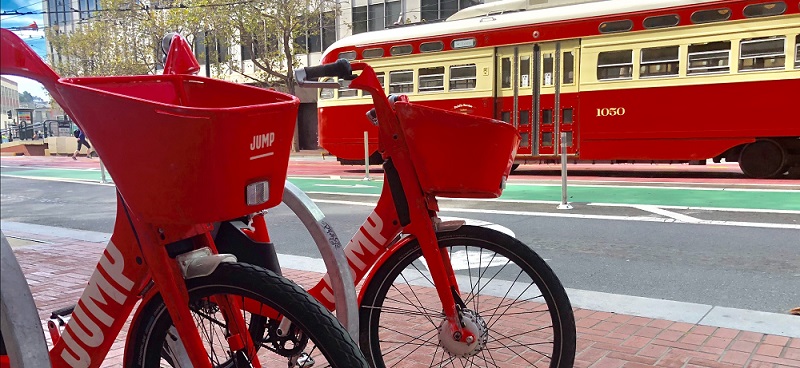
This week we reached the midpoint or our electric, stationless bikeshare pilot and we'd like to share our findings.
JUMP Bikes is the only permittee in the pilot, which began in January. They were also the only applicant that completed an application and met the requirements for a stationless bike share permit from the SFMTA.
When JUMP was first offered its permit in January 2018, the SFMTA created a pilot program that allowed for an initial rollout of 250 bikes, with the potential to add an additional 250 after the first nine months, pending agency review.
The evaluation shows that the JUMP bikeshare system is performing well and complies with the terms and conditions set forth by the SFMTA. The evaluation also identifies several potential improvements. Based on this evaluation, the SFMTA is in the process of granting the modified permit, which allows JUMP to operate up to 500 bikes for the duration of the 18-month pilot period. The SFMTA will complete its full evaluation of the pilot program in Spring 2019, including recommendations for if and how to permanently permit the operation of stationless bikeshare in San Francisco.
This evaluation covers four primary topic areas, based on the stationless bikeshare permit terms and conditions as well as San Francisco’s Guiding Principles for Emerging Mobility:
- Compliance with permit terms and conditions.
- System usage, trip details, ridership, and service provision.
- Public feedback and public engagement.
- Equity.
Key Findings
- Demand for stationless, shared e-bikes is high.
- Stationless bikeshare complements the City’s station-based bikeshare system, with different trip lengths, origins, and destinations.
- The lock-to design addresses major issues with sidewalk clearance.
- Stationless bikeshare leads to an increased demand for bike parking.
- Rebalancing guidelines for general redistribution and geographic equity should be improved.
- More robust equity engagement is needed to ensure stationless bikeshare effectively serves historically disadvantaged communities.
- Stationless bikeshare systems can serve the public interest when properly regulated.
Recommendations and Next Steps
- Continue the Pilot Program for further evaluation and expand the number of permitted stationless bikes to 500, contingent upon full compliance with all permit terms and conditions.
- Implementing the Emerging Mobility Data Specification and Application Programming Interface.
- Defining bike availability metrics for individual Communities of Concerns.
- Complete the final pilot evaluation by March 31, 2019, including recommendations for if and how to permanently permit stationless bikeshare in San Francisco.
Data Sharing
We have reached an agreement with JUMP with respect to data sharing and privacy overlays. JUMP will work closely with the SFMTA to establish a secure, real-time API, Application Programming Interface, which allows for active management and oversight of the Pilot. SFMTA staff will be able to query both real-time and historical data to guide planning, policy, and enforcement.